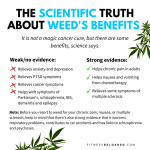David Baxter PhD
Late Founder
An analysis of 10,000 scientific studies on marijuana concretely supports only three medical benefits
by Akshat Rathi, Quartz
January 16, 2017
More than half the states in the US now allow the use of marijuana for medical purposes, as well as at least 16 other countries. Yet of the hundreds of purported medical benefits, only three are concretely supported by scientific evidence: treating chronic pain, nausea after chemotherapy, and symptoms of multiple sclerosis. This is the conclusion of a new 400-page report from the US National Academies of Science, Engineering, and Medicine, which analyzed more than 10,000 scientific studies.
One of the biggest benefits of such large reviews is that they put in context the weight of evidence supporting the many claims made in the name of cannabis. To help you understand those, we?ve coded the claims about both benefits and harms of cannabis. The ones with the strongest evidence are in bold, those with mild evidence in normal text, and those with limited or no evidence grayed out.
Purported benefits
Strong evidence
Moderate evidence
Limited or no evidence
Purported risks
Strong evidence
Moderate evidence
Limited or no evidence
by Akshat Rathi, Quartz
January 16, 2017
More than half the states in the US now allow the use of marijuana for medical purposes, as well as at least 16 other countries. Yet of the hundreds of purported medical benefits, only three are concretely supported by scientific evidence: treating chronic pain, nausea after chemotherapy, and symptoms of multiple sclerosis. This is the conclusion of a new 400-page report from the US National Academies of Science, Engineering, and Medicine, which analyzed more than 10,000 scientific studies.
One of the biggest benefits of such large reviews is that they put in context the weight of evidence supporting the many claims made in the name of cannabis. To help you understand those, we?ve coded the claims about both benefits and harms of cannabis. The ones with the strongest evidence are in bold, those with mild evidence in normal text, and those with limited or no evidence grayed out.
Purported benefits
Strong evidence
- Helps chronic pain in adults
- Lessens chemotherapy-induced nausea and vomiting
- Relieves some symptoms of multiple sclerosis
Moderate evidence
- Relieves sleep problems caused by obstructive sleep apnea syndrome, fibromyalgia, chronic pain, and multiple sclerosis
- Doesn't increase risk of cancers
Limited or no evidence
- Counters the loss of appetite associated with HIV/AIDS
- Relieves symptoms of anxiety, post-traumatic stress disorder, Tourette's syndrome, dementia, depression, all cancers, irritable bowel syndrome, epilepsy, Parkinson?s, and schizophrenia
Purported risks
Strong evidence
- Worsens respiratory problems, such as chronic bronchitis episodes
- Motor-vehicle accidents
- Low birth weight in babies
- Schizophrenia or other psychoses
Moderate evidence
- Injuries, such as respiratory distress, among children who smoke cannabis
- Impaired learning, memory, and attention
- Social-anxiety disorder, depression, and bipolar episodes in people with diagnosed bipolar disorder
- Substance abuse disorder for alcohol, tobacco, and other illicit drugs
Limited or no evidence
- Impaired academic performance, educational attainment, or social engagement
- Heart attack, stroke, diabetes, anxiety, and bipolar episodes in people not diagnosed with bipolar disorder
- Asthma or other chronic obstructive pulmonary diseases (COPD) when controlled for tobacco use
- Death from overdose

